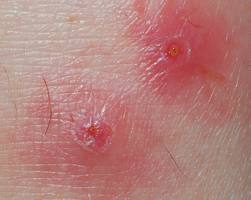SEMEN
ALLERGY: A BIZARRE FORM OF ALLERGY
Allergy
doctors always we say that a person can be allergic to anything with which it
comes in contact, and it's totally true.
Pollen,
dust mites, food or insect bites are causes of allergic reactions; but sometimes
our body also reacts to "ingredients" of sexual life, as if they were
foreign and dangerous, triggering a response closer to "reject" that
the planned "desire".
Sperm or semen
allergy is not common but there are increasing cases published. Recent research
refers to two important facts: the relationship with dog allergy and its likely
involvement as a cause of infertility. Consequently, some questions arise at
this point:
How does it
manifest semen allergy?
Can cause
infertility? Is there a solution?
What to do
with dog allergy?
If I am
allergic to dog also means that I am to the semen?
Some basics
before you start entering the field:
Semen
produced in the male genital apparatus comprises sperm (<10%) coming from
the testis and seminal fluid (> 90%) coming from the prostate gland and
seminal vesicles.
The seminal
fluid is responsible for nurturing and transport spermatozoids (sperm). This is
achieved because the amount of substances that composes it (vitamins, sugars,
proteins, electrolytes, cholesterol, hormones ...).
One of the
contraceptive methods used is vasectomy, it is cut and ligated the ducts
through which the testicles release sperm. As a result of this operation
ejaculated semen does not contain sperm, but it contains the rest of seminal
fluid.
Once
reviewed these concepts will explain the most important features of this
exceptional allergy:
• Although
not a common allergy is thought that there are probably more women affected
than the statistics show. It is possible that many women have "local
discomfort" that relate to sexual activity and do not think that may be
due to an allergy, so do not go to the doctor. Also, the symptoms can be easily
confused with other disorders such as itching or irritation caused by fungi, parasites
or bacteria.
• Most
women tend to be around 30-40 years and have an atopic background with personal
or family history of asthma, allergic rhino-conjunctivitis and atopic
dermatitis. The changes after pregnancy, gynecological surgery or devices like
the IUD could alter local immunity and predispose to this allergy. Vasectomy in
men could also modify the characteristics of seminal fluid and make it more
allergenic.
• The substance
responsible for this allergy is a protein, is present in the seminal fluid and
is known as PSA (Prostate-Specific Antigen). PSA is produced in the prostate in
order to liquefy the semen for sperm to mobilize freely. It is also believed to
be useful for coating dissolved woman's cervical mucus, allowing the sperm
entry. In men with prostate problems (tumors, prostatitis) measurement used his
blood to complement the diagnosis and monitoring, since a small part of this
PSA can pass into the bloodstream.
• Symptoms
occur during or immediately after intercourse (first time) and if you continue
having sex almost probably the clinical onset will start earlier and will have
more severe symptoms. Naturally never occur in cases where it is used a preservative
(condom) which prevents contact with the semen.
• The
usually mild local reactions consist of signs and symptoms such as itching,
burning, redness, swelling or edema in the vulvovaginal area that has been in
contact with semen. Other general symptoms are difficulty breathing, abdominal
pain, vomiting, urticaria, and edema and may even cause anaphylactic shock.
• The
diagnosis has to be done very carefully. The clinical history is critical
(immediate symptoms after sexual intercourse and full resolution picture if you
use a condom). To confirm the skin test is used directly with the seminal fluid
of the couple involved and the analytical determination of specific IgE blood
against seminal fluid. Both tests are positive.
• In the
event that the woman is allergic to a food or a drug, we have to rule out that
the sexual partner had previously consumed and which can be removed through
semen and make you an allergic reaction.
• Once it
is diagnosed, the only way to prevent a reaction is by using condoms.
• The
treatment in case of a mild reaction are antihistamines, and if severe
(anaphylaxis) self-injectable epinephrine (adrenaline). Some patients have been
able to reach long-term desensitization with subcutaneous immunotherapy or
local intravaginal seminal fluid.
•
Infertility could not be directly related to this type of allergy, and more
studies are needed to confirm this. Yes it is known that there is a greater
difficulty conceiving because they need sex always with condoms to prevent
allergy symptoms. To solve the problems of reproduction, to couples who want to
have children are made artificial insemination with washed sperm, that is
free of seminal fluid and thus free of allergy.
• One point
remains to be clarified in this allergic disease is whether the clinical
manifestations appear only after having sex with the same partner or appear
with different sexual partners. Due to the strictest privacy of patients this
aspect is quite difficult to clarify.
Okay, all
this is fine, we have clear concepts of semen allergy and involvement of PSA
presents in the seminal fluid as the main culprit, but: what has to do with the
dog allergy?
In 2008, Dr
Basagaña, from the University Hospital of Girona, in the North-East of Spain,
and his team published a worldwide pioneering study in a prestigious research
journal of Allergy (J Allergy Clin Immunol 2008, 121: 233-9), which found that
women with dog allergy also could be allergic to the seminal fluid. This is
because the proteins involved in the two allergies are very similar and the
body can get confused, is what we call cross-reactions.
When a
person is allergic to the dog, which is a protein found in the epithelial cells
of the animal (e.g., dandruff, hair). The latest advances in molecular
diagnostics have managed to find five proteins that are involved in total, of
these five proteins is the fifth (Can f5) which is substantially similar to the
PSA responsible for semen allergy. This Can f5 is produced exclusively in the
prostate of male dogs.
Allergic people
to dogs can be allergic to one of these five proteins or several of them. Women
in the dog allergic protein in which is responsible Can f5 (similar to PSA) may
develop an allergy to semen due to a cross-reaction with the PSA.
Note that
this protein is present only in male dogs and not females. This could explain
why some people just "notice allergy with other dogs but not yours."
If your dog is female and only have protein allergy Can f5, perfectly tolerate
any dog that is not male.
I admit
that even I have looked in consultation with disbelief and skepticism to a
patient who after diagnosing a dog allergy he told me the typical phrase "But,
I am sure I am not allergic to my dog!"
Final
conclusions:
• The semen
allergy exists and is produced by a protein produced by prostate (PSA) and
present in the seminal fluid.
• It is not
clear if semen allergy is the cause of infertility problems. For couples with
this type of allergy, it is possible they can conceive a child by means of
artificial insemination with washed sperm (no seminal fluid).
• Some
women with dog allergy, not all are to a protein, Can f5, produced in the
prostate of male dogs and very similar to human PSA. These women may develop an
allergy to semen due to a cross-reaction between the two proteins (PSA and Can
f5).
• Dog allergic
patients depending upon the proteins involved in allergy can be differently
sensitive to male and female dogs.
In forthcoming
entries I will write the second installment of the trilogy on sexuality and
allergy: "Allergy and contraception: hormones, IUDs, condoms,
spermicides". Among other things I will show the wide variety of allergies
that can be found in the world of condoms (touch, smell, taste).

























.jpg)













